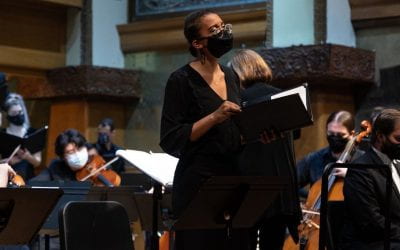Speaking Truth to Power
American Dream Reconsidered ConferenceTo close out the American Dream Reconsidered Conference, a group of Roosevelt University students reflected on their work as activists and organizers against racial injustice.
Ameshia Cross, who earned her master’s of public administration from Roosevelt University, moderated the final panel of the week. As a political analyst with the Sinclair Broadcasting Group, she writes and produces her own show, Cross Point.
“Roosevelt has meant so much to me over the years,” she said. At the University, her experiences as a first-generation college student and “a Black person with a voice” were welcomed and appreciated.
“Young people are the folks who rise above and the people who push social change across this country,” Cross said. “I’m proud, honored and thankful that Roosevelt continues to produce those young people and watch them grow.”
The panelists weighed in on institutional and systemic racism, and how they see these forces manifested in 2020. Khaliya Jackson, a double major in sociology and political science with a minor in social justice studies, explained how institutions are “refractory,” with the potential to heal or do terrible damage.
“The function of oppression is to be adaptable and pervasive,” said Jackson, talking about how racism impacts every aspect of society, down to the default pink tone of Band Aids.
Jackson said they hope that this year’s conversations, readings and shared knowledge will help one day “remove these institutions and stop them from functioning the way they currently are.”
Cross asked the panelists about how the pandemic has impacted Black communities, and what leaders at the local and federal levels should be doing.
Julia Doh, a second-year doctoral student in clinical psychology, described how Black people are more likely to die from COVID-19 due to lack of access to healthy, fresh food, pre-existing health conditions like heart disease, and increased exposure as essential workers.
“There hasn’t been enough action to help prevent the spread of COVID to help support these communities that are suffering,” Doh said.
As a future clinical psychologist, Doh hopes to work in underserved communities after graduation and destigmatize mental health care across the African diaspora.
“If I become a clinician, I can hopefully make that change and help with the stereotype in our community that we don’t need to talk about mental health.”

Cross asked the group how their personal narratives fit into their work as organizers. The panelists were candid about the impact of racial injustice on their personal lives. Troy Gaston, a political science major, spoke passionately about mass incarceration. Gaston’s father had been incarcerated before Gaston was born, and he was later incarcerated himself.
When it comes to unequal distribution of resources, he explained, “What you see in prison is very much what you see in in our communities.”
Gaston said that only 3% of the corrections budget goes to rehabilitative programs. In turn, mass incarceration leaves families vulnerable to violence and economic instability.
“I’m passionate because it’s close to home,” Gaston said. “It’s close to all of us.”
The panelists thoughtfully answered a slew of questions from viewers, sharing their perspectives on the American dream and their hopes for the movement. They spoke about the power of open and honest dialogue as a starting point for real change.
“I am hopeful because of people like you,” Cross said to the group of Roosevelt students. “It gives me hope that the mantle is going to be carried on, that there are people who not only understand the history but are willing to roll up their sleeves and fight.”
The American Dream Reconsidered is a free conference that invites scholars, activists and leaders to explore the modern American dream. Sessions delve into immigration, health care, politics and more in America today. With optimism and hope, our panelists share visions for the future of our democracy.
More in this section
Students Develop Tools for Social Activism
As Mansfield Fellows, 15 students spent last summer learning new ways to effect social change.
In 2021, These 11 Alumni Stepped Up for Their Communities
With determination and vision, 11 alumni award winners have made their mark in on their communities through the trials of the pandemic.
The Future of the American Dream
Roosevelt’s signature conference returned in person, inviting scholars, politicians and authors to explore the hopes of our democracy.



